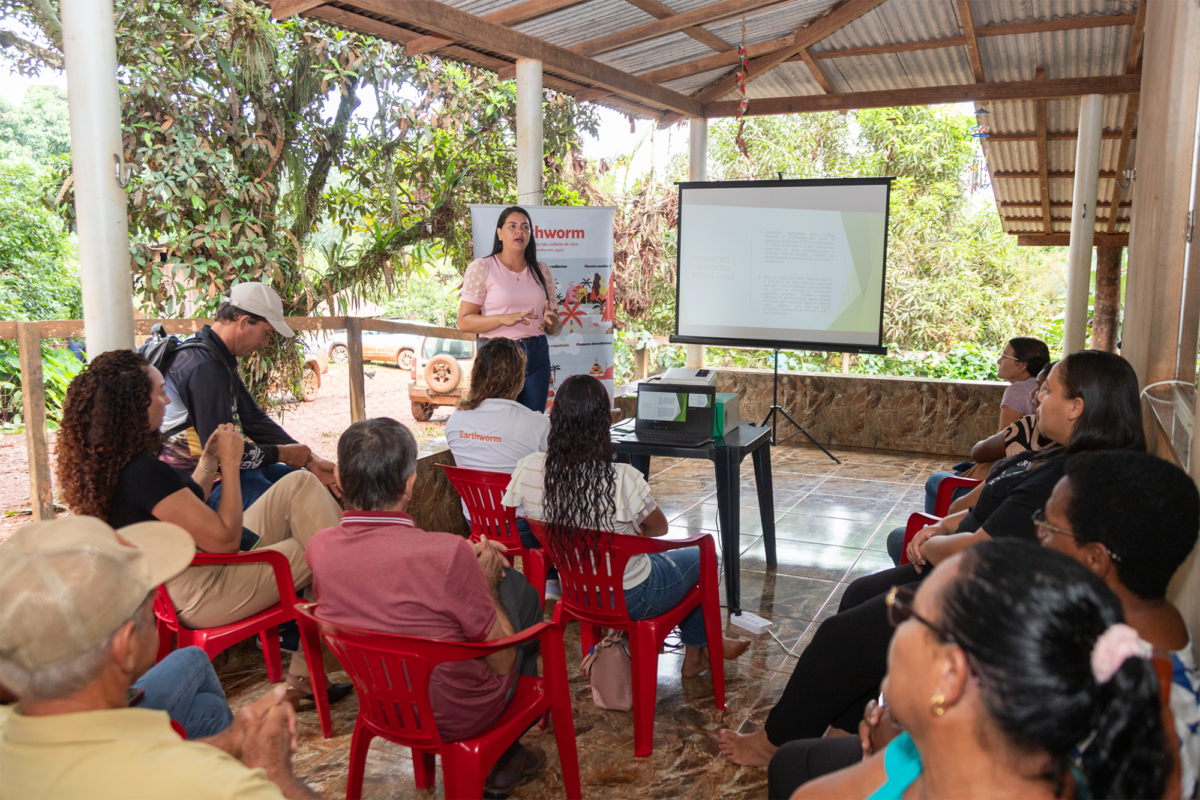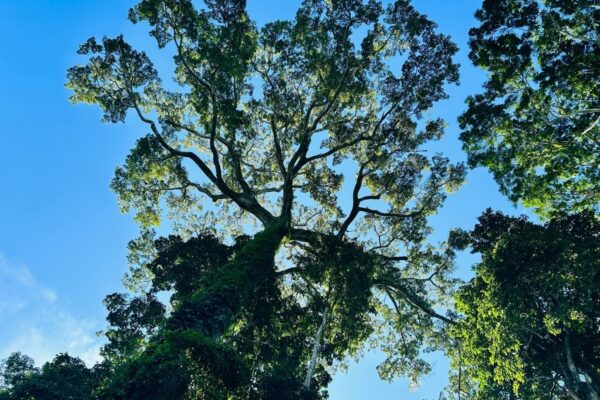In a world increasingly focused on sustainable agricultural practices, Earthworm Foundation is leading global initiatives to transform cocoa supply chains. One of the projects that exemplifies this commitment — blending environmental preservation with social development — is Seeds of Change, implemented in the Brazilian Amazon.
Targeting cocoa farmers, the main goal is to promote environmentally, socially and economically strengthened agricultural businesses, geared towards increasing food security, diversifying farming families' sources of income and encouraging female empowerment.

Located in the heart of the Amazon Rainforest, the Transamazon region offers both unique opportunities and significant challenges for sustainable agriculture. Spanning approximately 219 million km² — about five times the size of France — it is rich in biodiversity but faces environmental threats such as deforestation, illegal logging, among others.
Cocoa production in the region is mostly carried out by smallholder family farmers. In the state of Pará alone, there are over 30,000 such producers living in rural communities across eight municipalities: Altamira, Anapu, Brasil Novo, Medicilândia, Pacajá, Placas, Uruará, and Vitória do Xingu.
"It is not just about producing cocoa; you have to enjoy what you do. You must care for the plant nursery, seek quality seeds. And when planting, cocoa isn’t just a source of income. It is in the blood of the Transamazonian people. Beyond making money, it means something more," explains Michel Silva da Costa, cocoa producer and Production Director at COOP 147. He adds: "Cocoa is part of my family’s life, so more than planting 'rivers' of cocoa, it is about producing with quality — both in terms of yield and processing."

The region is ideal for promoting Agroforestry Systems (SAFs), especially those that include cocoa. However, many producers face logistical barriers, lack technical support, and struggle with environmental compliance. That is why they are the focus of Seeds of Change.
Launched in 2023 with the support of Cargill, Seeds of Change aims to benefit 207 smallholder cocoa farming families — around 828 people — through a mix of environmental, economic, and social interventions. The project seeks to strengthen the organizational capacity of local cooperatives, with a focus on boosting female participation and leadership.
It combines training in modern agricultural practices, including land management and financial literacy, with technical support for sustainable cocoa production, while fostering agricultural systems that are more resilient to climate change and market fluctuations.
On the gender front, Seeds of Change empowers women through capacity-building workshops and leadership training. This inclusive approach contributes to transforming deep-rooted inequalities, at the same time strengthening cocoa farming communities.

"I've learned how to prune cocoa properly and at the right time, how to apply fertilizer correctly, and how to harvest when the fruit is ripe to extract the pulp. I’ve learned everything about cocoa — and I liked it! It has improved our production and made our work easier." - Jania Maria Simão, cocoa producer
One of the strategic axes of Seeds of Change is to encourage the adoption of Agroforestry Systems (SAFs) which, in addition to improving cocoa yields, serve as essential processes for restoring degraded land, conserving biodiversity and sequestering carbon. Although the project does not directly fund the implementation of SAFs, it promotes this practice through technical assistance to producers, who are advised on the benefits of integrating cocoa with native forest species. This is in line with the Earthworm's strategy in Brazil of promoting sustainable production practices in sensitive areas of the Amazon.

The project also promotes crop diversification, increasing the food security of local communities and generating new sources of income. This diversification creates more stable economic conditions and makes agricultural systems more resilient to environmental and market disruptions. SAFs are also key to mitigating deforestation — an urgent priority in the Amazon.
"There have been many waves: timber, cattle — which were once people’s dreams. But today, I see cocoa as that dream. Those who grow cocoa now enjoy a better quality of life. Cocoa is essential in this region. On a small plot, you can earn a living. I believe cocoa is the main source of income in our Transamazon region," says producer Michel.
Despite the growing international demand for cocoa and recognition of award-winning products at global fairs, Transamazonian producers face challenges in meeting the European Union’s Regulation on Deforestation (EUDR). This legislation requires full transparency and verification that products — such as cocoa — are not linked to deforestation.
The EUDR could lead to market segmentation, with only compliant producers accessing European markets. Others may face restrictions or exclusion from global supply chains. The main challenges for producers in this region involve traceability and land documentation.
"Most small farmers still rely on manual record-keeping, sometimes using spreadsheets, but without digital integration to verify cocoa origins. Moreover, informal trade — where many intermediaries buy cocoa from various sources without proper documentation — poses a serious risk to traceability," explains João Carlos Silva, Earthworm Foundation’s Director in Brazil.
Silva emphasizes the need for digitalization of production and marketing records. Cooperatives must adopt tech tools that accurately trace the origin of cocoa beans, preventing contamination with non-compliant lots.
Another challenge is land tenure: many producers lack formal documentation proving legal land use, making compliance difficult. "To meet these modern requirements, farmers in the Transamazon region need technical guidance and financial resources to obtain legal documentation," adds Earthworm's Director in Brazil.
Through Earthworm Foundation’s work in the region, a strategic partnership was established with the Sustainable Agriculture for Forest Ecosystems (SAFE) project, implemented by the Deutsche Gesellschaft für Internationale Zusammenarbeit (GIZ) GmbH. This collaboration aims to better understand the local context, develop guidelines, provide training, and strengthen local associations and cooperatives.

As part of this collaboration, a study is underway to assess how EUDR will impact cocoa supply chains in the local scenario. The study aims to prepare producers for compliance and prevent trade restrictions or sanctions.
As part of this collaboration, a study is being finalised to assess the impacts of the EUDR on the cocoa production chain in the region. The analysis will support SAFE project actions aimed at preparing cocoa producers to meet these new regulatory requirements, helping to avoid potential export barriers and economic sanctions.
"While the EUDR poses challenges, it also offers an opportunity to drive more sustainable agricultural practices, including the use of SAFs. These systems not only prevent deforestation but also improve soil quality, promote biodiversity, and build climate resilience. We are developing clear guidelines and tools to help producers comply with the regulation and create a more transparent supply chain," says Silva.
For companies and farmers seeking to ensure sustainable cocoa production, key practices should be considered.
"The Cocoa Curriculum is an important reference in Brazil for guiding continuous improvement toward more sustainable production, and Earthworm Foundation has been engaging producers to meet even more rigorous standards," reflects Josinara Garcia, Project Manager in the Transamazon.

The path to a responsible supply chain goes through several stages that involve, in addition to proper environmental management, the promotion of social justice and the strengthening of local communities.
Combining cocoa with forest species helps preserve biodiversity, improve soil health, and enhance climate resilience. Using native trees, for example, provides natural shade and supports long-term productivity.
Monitoring systems are essential to prove that cocoa meets environmental standards. These tools also assure consumers and global markets of the product’s sustainable origins.
Success depends on farmer education. Organizations must offer regular training in techniques like soil management, biological pest control, and efficient water use.
Staying updated on policies such as the EUDR and preparing supply chains for compliance are important aspects. This includes developing systems that ensure production is not associated with deforestation or environmental degradation.
Promoting economic and social inclusion for smallholders is crucial. Access to credit, fair markets, and support networks empowers farmers and strengthens the cocoa value chain.

O uso de tecnologias inovadoras, como ferramentas de análise de solo, drones para monitoramento de áreas agrícolas e sistemas de irrigação inteligentes, pode aumentar a eficiência da produção, reduzir desperdícios e diminuir o impacto ambiental.
Tools such as soil analysis kits, drones, and smart irrigation systems improve efficiency and reduce environmental impact.
Earthworm Foundation Brazil is at the forefront of efforts to transform the cocoa supply chain in the Transamazon region. Through initiatives like Seeds of Change and the EUDR impact study, the organization is driving sustainable development while strengthening cocoa-growing communities.
By combining agroforestry, technology, and transparent supply chains, Earthworm is building a model that can inspire agriculture globally.
Companies that want to adopt a sustainable cocoa production need to look beyond the immediate gains and commit to environmental preservation and social justice. By following the recommendations, they will be able to create a production chain that respects the environment, benefits farmers and meets regulatory requirements, making Brazilian cocoa a global benchmark.
"For companies and producers that adapt, the EUDR can be an opportunity — a chance to differentiate and add value to Brazilian cocoa, especially in the fine and organic segments, which already follow stricter sustainability standards," concludes João Carlos Silva.


